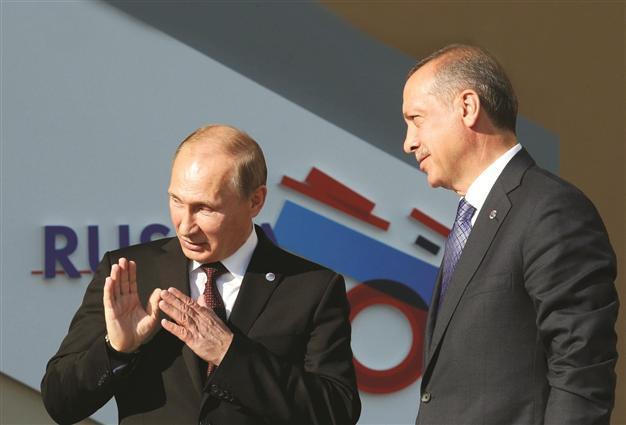Turkey probes chemical ‘proof’ by defected Syrian
ANKARA – Hürriyet Daily News

Russia’s President Putin (L) welcomes Turkish PM Erdoğan before the first working session of the G-20 Summit in Constantine Palace in Strelna near St Petersburg as the Russian intel ship CCB 201 passes Turkey’s Bosphorus. REUTERS photo
Turkish security officials are still in the process of examining evidence introduced by Abdeltawwab Shahrour, a Syrian forensic medicine who defected to Turkey, amid growing expectations of an international response against the Syrian regime’s use of chemical weapons against civilians.The Turkish security officials were not in a position to deny Shahrour’s defection to Turkey, although they did openly confirm that the expert was present in the country. “Our assessments and examinations are underway. This process will take some time,” officials told the Hürriyet Daily News yesterday.
Shahrour, the head of the forensic medicine committee in Aleppo, is believed to have obtained evidence that Bashar al-Assad’s administration wielded chemical weapons in an attack near Aleppo in March. The Istanbul-based Syrian opposition’s spokesperson had announced that Shahrour would publicize the evidence in a press conference that was later cancelled. The attack in March at Khan al-Assal in the northern province of Aleppo killed more than two dozen people, and involved the nerve agent sarin.
Chemicals used on numerous occasions
The regime and opposition groups have accused each other of chemical weapons use, although indications point the finger at the al-Assad forces, as the rebels have no sophisticated military equipment to launch them.
Apart from the Khan al-Assal attack, Turkish security officials believe the regime forces have used chemical weapons on numerous occasions in different clashes with opposition groups since early 2013.
Although the chemical weapons and other forms of weapons of mass destruction are considered to be used for strategic purposes in wars; the Syrian regime has been using them for tactical aims, especially when they find themselves in trouble in ongoing urban warfare with the rebels. As the casualties from the limited use of these weapons have not exceeded two or three dozen, no country opted to describe such attacks as “crossing red lines.”
French newspaper Le Monde reported that the Syrian army used chemical weapons against opposition groups in late May in the outskirts of Damascus. It said two French journalists witnessed over several consecutive days the use of explosive chemical weapons and their effects on rebel fighters in the village of Jobar outside Damascus.
Following minor uses of chemical weapons, the Syrian regime allegedly wielded these weapons on a much larger scale on Aug. 21, claiming the lives of more than 1,300 in the outskirts of Damascus.
Although U.N. experts have not yet submitted the report of their investigation at the crime scene, Western powers and Turkey have already declared that they have sufficient evidence that such weapons were used by the regime.
A story published on Aug. 30 by Turkey’s Anadolu Agency detailed how this latest attack occurred, underlining that the 155th Missile Brigade, including the 51st, 52nd, 577th, 578th, 579th and 1097th missile troops, as well as a technical support team, were allegedly involved in the attacks. Some 15 to 20 missiles with chemical warheads were fired by the 155th Missile Brigade in Kufeyte and forces from the 4th Armored Division on Qasyoun Mountain. FROG-7/Luna and/or M600 missiles were fired from Kufeyte, while rockets with a 15-to-70-kilometer range were fired from Qasyoun, the agency reported, without explaining its source.
No confirmation on Ali Habib defection
Meanwhile, Turkish security sources did not confirm the defection of former Defense Minister Ali Habib to Turkey, although the Syrian opposition claimed the former minister had defected to Syria’s northern neighbor.
















